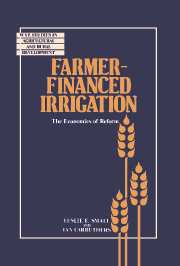Book contents
- Frontmatter
- Contents
- Preface
- 1 Irrigation financing in perspective
- Part I Analysing financing policies: theory and concepts
- Part II Criteria for evaluating irrigation financing policies
- Part III Financial autonomy and user fees: key implementation issues
- 9 Establishing financial autonomy
- 10 Setting irrigation fees: reconciling the need for funds with farmers' ability to pay
- 11 Collecting irrigation fees: fostering a willingness to pay
- 12 The political economy of irrigation financing
- 13 Conclusions and recommendations
- Notes
- Index
12 - The political economy of irrigation financing
Published online by Cambridge University Press: 05 November 2011
- Frontmatter
- Contents
- Preface
- 1 Irrigation financing in perspective
- Part I Analysing financing policies: theory and concepts
- Part II Criteria for evaluating irrigation financing policies
- Part III Financial autonomy and user fees: key implementation issues
- 9 Establishing financial autonomy
- 10 Setting irrigation fees: reconciling the need for funds with farmers' ability to pay
- 11 Collecting irrigation fees: fostering a willingness to pay
- 12 The political economy of irrigation financing
- 13 Conclusions and recommendations
- Notes
- Index
Summary
This chapter will outline some of the political questions relating to irrigation financing. There is a variety of political interests and pressures affecting the practical establishment and implementation of financial reform of irrigation institutions. Inevitably the issues that arise will include the political viability of any scheme for irrigation fees; the genuine political problem of charging low income farmers anything at all, even if product prices are increased; the opposition to reform of officials who benefit from the opportunities for corruption created by the economic rents that occur in subsidised irrigation; and coping with the genuine social and cultural impediments to change when traditional values are in conflict with modern methods of financing.
Prospects for reducing political difficulties with a user fee policy clearly have to be explored. In particular, we have discussed the idea that decentralised and financially autonomous irrigation organisations could reduce the political visibility of irrigation fees. The importance of ideas such as indexing fees to maintain their real value over time, thereby reducing the frequency with which changes in the rates need to be made, also needs to be considered. The possibility of using the changes created by improvements such as rehabilitation as an opportunity for reforming the system of user fees will be reviewed. But first the general area of the politics of water must be explored.
Water charges and culture
Questions such as whether, how, when and at what level user fees are to be charged are matters that must take full account of the surrounding culture, rural social and institutional structures, and behavioural ‘norms’.
- Type
- Chapter
- Information
- Farmer-Financed IrrigationThe Economics of Reform, pp. 203 - 215Publisher: Cambridge University PressPrint publication year: 1991



